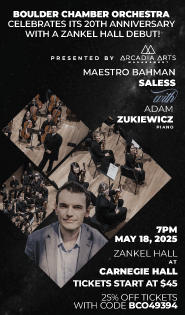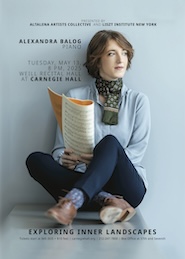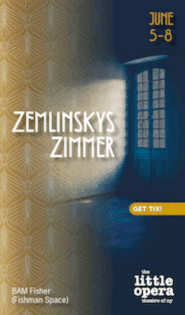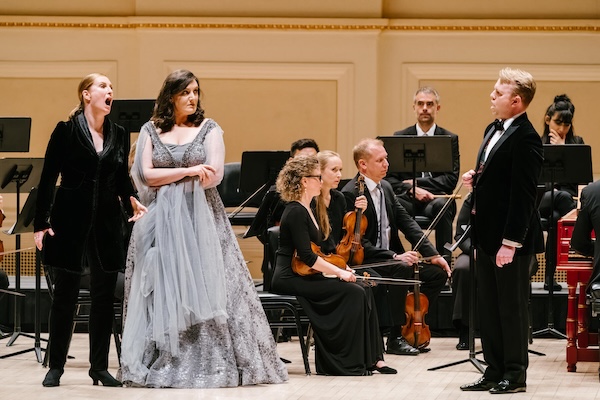Performances
Met’s new “Figaro” cast adds seasoning, comedic spark to superb vocalism
If opera casting were a competitive sport, there would have been […]
Rachmaninoff fares best in uneven outing from Cliburn winner Yekwon
Those gold medalists just keep on coming. Last week at Carnegie […]
Parlando closes season with a concise cabaret night
Parlando concluded its season with the launch of “The Cabaret Project” […]
Bruckner emerges best in mixed German program by Young, Philharmonic
On paper, this week’s New York Philharmonic program looks like a […]
Ax finds form in fantasy in Carnegie recital
One might have known an evening of fantasy with Emanuel Ax […]
Articles
Opera Lafayette to premiere oldest known opera by black American composer
Sometimes finding a musical treasure is sheer serendipity. A librarian cleaning […]
Top Ten Performances of 2024
1. Schoenberg: Verklärte Nacht. Mahler: Symphony No. 1. Klaus Mäkelä/Royal Amsterdam […]

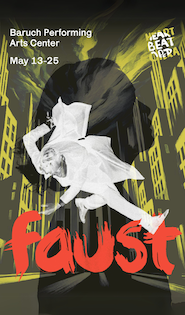
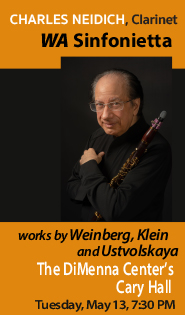
Opera review
A rich and remarkable cast makes for a cherishable “Cesare” with English Concert
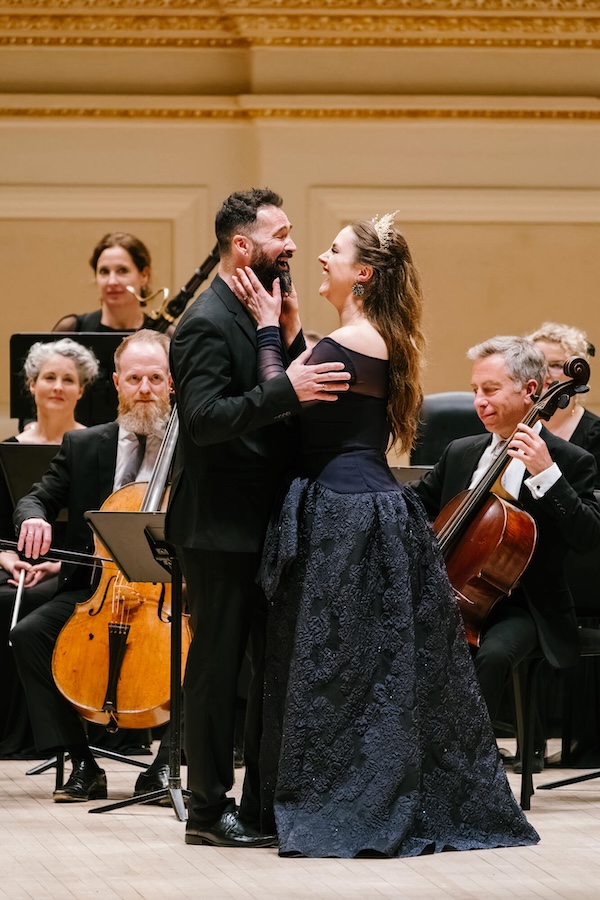
For any classical musician or ensemble to take familiar music and make it sound new is a high achievement. For the same artists to take how they play and perform, and continually refresh it so they sound revelatory at each appearance, is an even greater achievement. And that’s just what The English Concert and artistic director Harry Bicket did once again in Carnegie Hall Sunday afternoon, for their annual Handel opera concert performance.
There are dozens of Handel operas, and most infrequently performed so they often sound new. Sunday, it was Giulio Cesare in Egitto, one of the composer’s most well-known works. But even with that familiarity, Sunday’s performance was like hearing something new and extraordinary.
The English Concert is one of the finest early music groups around, and they always bring along a stellar group of singers. This cast might have been the best one has heard with them yet, featuring at the top countertenor Christophe Dumaux as Giulio Cesare and soprano Louise Alder as Cleopatra.
This opera has an unusual set of voices, owing to the availability of castrati for the premiere productions. There were two other countertenors: John Holiday as Tolomeo and Meili Li as Nireno, Cleopatra’s brother (and Egyptian King) and servant, respectively. There was also the mezzo-soprano pair of Beth Taylor as Cornelia (the widow of Cesare’s rival, Pompey) and Paula Murrihy as her son Sesto. Baritones Thomas Chenhall and Morgan Pearse filled out the cast as Cesare’s aide Curio and Tolomeo’s general Achilla.
There was exciting variety within each vocal type, and beyond the headlining drama between Cesare and Cleopatra there were stunning and enthralling performances from Taylor and Holiday.
Typical of baroque opera plots, this one is full of love, death, and fateful plot twists. Cesare comes to Egypt in pursuit of Pompey, who has already been captured and executed by Tolomeo. The king desires Cornelia, though she and Sesto swear revenge. Meanwhile Cleopatra seduces Cesare, whom Tolomeo sees as an enemy—Cesare jumps off a cliff, survives, and returns to help Cleopatra take the throne. The scenario is serviceable enough yet works as the frame on which hangs three-plus hours of glorious music.
Beyond what seems like an infinite well of melodic ideas, the brilliant setting of text to music, the elegant harmonies, and the rhythmic drive, there is tremendous characterization in this music. Cesare and Tolomeo express their stature through dazzling virtuosity, Cleopatra has a sexy self-assurance, and Cornelia’s music is powerful and moving. All the singing was masterful.
Dumaux’s voice was light but fully penetrating. In the full context, Cesare is a slightly frivolous and very show-offy role. He is above everyone else, and the music is full of confidence and the feeling that he’s untouchable. The part demands superior technique, and Dumaux had it, with verve and excellent intonation, as well as the sense of humor to make it even more entertaining. There was expressive depth too, like in his aria “Non è si vago e bello,” having first seen Cleopatra (who is in disguise).
Alder was exceptional as Cleopatra. Her voice was shining and full, and her singing full of the virtuosic sensations of a character who is bursting with emotions and vitality, both serious and comic. Her “V’adoro, pupille” was graceful and luminous, “Piangerò la sorte mia” was gripping and a highlight of the performance, emotion pouring through her precision and beauty of tone.
Cornelia is the emotional core of the opera, pressed through antagonism with Tolomeo and devotion to Sesto. Taylor and Holiday were outstanding because they simply have astonishing instruments. She has a mezzo range and a contralto sound—the part is originally notated in alto clef—with enormous dimensions and color like brandy and purple velvet; her chest voice had an uncanny and deeply alluring masculine timbre. The way she shaped her sound with dynamics was beautiful and most affecting,
In the extraordinary duet with Sesto—a mellifluous and lovely Murrihy—that ends Act I, the contrast between the qualities of their voices, even in close harmonies or in unison, was incredible. Against Taylor, Holiday was marvelous, but in a contrasting way. His sound was precise, slicing, and direct as a laser, with even more agility than Dumaux. And he had an equally uncanny feminine quality. It was fascinating to hear him sing on his own, and the scenes with Taylor, like “Belle dee di questo core,” were otherworldly.”
There was also the great pleasure of the instrumental ensemble. The way they make everything sound so easy and perfect is deceptive in that the playing seems unremarkable while the sound is anything but. The ensemble’s smooth, precise intonation and articulation are a large part of that, not only finer than early music ensembles in general but better than most modern groups. Tempos come off as ideal because the singers have the right amount of time and space to shape the slow lines and long, fast figurations, while still getting plenty of time to breathe. Bicket, who conducts from the harpsichord, also thickens continuo lines just enough to give a pleasing heft to everything.
Simple, witty theatrical touches lent did so much with the minimal concert staging: Achilla delivered Pompey’s head in a Macy’s bag; Cesare came down the aisle and sat in the audience—and sang from his seat—for the Act II play-within-the-play that Cleopatra stages to entice him; horn player Ursula Paludan Monberg joined him at the front of the stage for their aria-with-obbligatto/duet “Cesare, all tua destra,” and later Dumaux had a teasing interaction with concertmaster Nadja Zwiener during “Se in fiorito.”
The assassinated characters fall dead on the stage, then get up and walk off when their scenes end. That made sense, because in hands like these, Handel will never die.
Anne-Sophie Mutter, Pablo Ferrández, and Yefim Bronfman play Beethoven and Tchaikovsky, 8 p.m. Tuesday carnegiehall.org
Calendar
May 6
JACK Quartet
Austin Wulliman: Escape Rites
Austin Wulliman: The Late Edition […]
News
Philharmonic to cast a wide net of artists, repertoire in 2025-26 season
In New York City, at the foundation of American culture, and […]
Met to debut works by Bates, Saariaho and Frank in 2025-26 season
The Metropolitan Opera’s 2025-26 season commences September 21 with a notable […]
